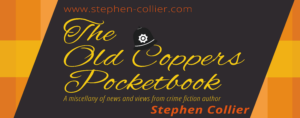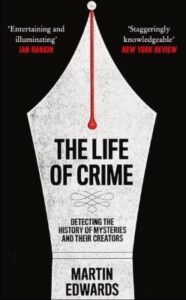

Crime fiction is a strange entity. Not only does it cross the boundaries of age, but it also crosses the boundaries of genre’s. I have recently been reading a very large tome, some two inches thick entitled ‘The Life of Crime: Detecting the history of mysteries and their creators.’ It is written by Martin Edwards a well known author of a number of fiction and non-fiction crime related books.
I am currently on Chapter 21 called Murder and its motives. It discusses the classification of the six headings of murder motives proposed by F. Tennyson Jesse – the neice of Alfred. Lord Tennyson. Those six classifications were: Murder for Gain; Revenge; Elimination, or Jealousy; and a lust for killing, and from conviction.
If you consider every book ever written by any crime author, I can almost guarantee that one of those six classifications can be applied to any books.
Thinking on my offerings, Blind Murder is steeped in revenge. Driving Dead is about elimination and Crimson Dragon covers gain, revenge and elimination.
It may not be in the writers mind at the time, but the story itself does, I think, naturally develop one of those six headings. Over the years can we add to these? After all Jesse was talking about this back in 1924. So what else could we add, crimes of passion or greed? What about mental disorders an issue prevalent in today’s society and the underlying concept of many domestic noir novels. Whatever the case and whatever motives show throughout a crime novel, there is no doubt that the demand for crime novels will not go away anytime soon.
I offer this thought to for when you read your next crime fiction novel. How would you classify its primary theme?

I can reveal that my new podcast is now available for a listen.
This is a new venture.
I’m still learning the ropes to make it as professional as possible.
I hope to also provide a video of the podcast as well, but that’s more difficult!
“My late arrival [into writing] is just an indication that my life is worth the wait.” (Anon)
When I wrote my first crime fiction novel, I was naïve, to say the least. I almost saw it as a get rich quick scheme. How wrong was I! But I have to ask the question now as to whether my late arrival into writing has had a deleterious effect on getting any representation or just that what I write is complete pants!
Unlike many authors who made writing a career from their desires of an early age, my toe-dipping into fiction writing did not start until the late noughties. Running my business after I retired from the police took all my time & effort, which paid off. Many contacts I made, I am still in touch with. But the further than one gets away from “The Job”, the less operationally competent you get. It was a realisation that my niche product of training police officers would not last forever. I had to do something else. Writing became that ‘something else.’
I quickly discovered that the whole industry, not just crime fiction, swims in shark-infested waters. The problem of what used to be called in some circles, ‘vanity publishing’ catered to those individuals who, like me, wanted to see their name in print. That, however, was not and has never been my motivation. My personal upbringing taught me to do everything properly and with due diligence. The police service taught me new skills in everything we did. No training meant you couldn’t do it. And this is the way I do things, even now. If this was something I was going to do as a serious new job, then I needed to be ‘in’ the industry.
That was easier said than done. Even gaining a MA in Crime Fiction Creative Writing never seemed to light the fire of industry professionals. It’s always a case of being in the right place at the right time, despite working your butt off. It’s also about who you know and not what you know. But that’s the way of the world, isn’t it? During my ‘training’ as a crime fiction author, I will always remember my MA course leader, the indomitable Henry, (now Professor) Sutton (a.k.a. Harry Brett) saying to me that: –
“self-publishing is alway a direction in which you could choose to go.”
That was all very well, but in order to do that you had to have money to self finance the project. Kindle Create and other free independent author platforms were only just coming into their own in the mid-2010s. The industry itself looks upon a self-published author as a second degree citizen. Some don’t, but some still do. Although now the industry has to note that some self- published authors are in the top ten or a book company’s (i.e. Waterstones or WHSmith) top sellers. So there is hope and I think that keeps me going.
I’m just as vain, self-deprecating and socially introvert as the next self-published author who wants to be recognised as the greatest fiction writer since sliced bread. The genre is, I know, awash with crime fiction authors. But I realise that to an agent or publisher I have no longevity being at the end of my working life as opposed to being at the beginning. They won’t get big bucks for their dollar. But that’s OK. I’ve concluded with reluctance that it’s never going to happen, but that doesn’t stop me trying.
LITERARY QUOTE OF THE MONTH
‘The most difficult part of any crime novel is the plotting. It all begins simply enough, but soon you’re dealing with a multitude of linked characters, strands, themes and red herrings – and you need to try to control these unruly elements and weave them into a pattern.’
